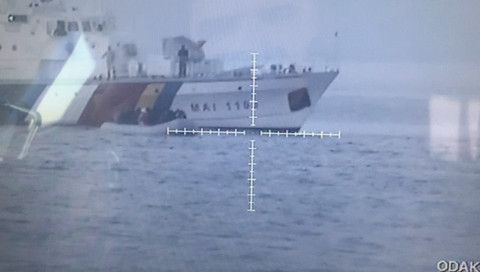The EU’s border agency Frontex is defying European Commission demands to investigate reports they are preventing asylum seekers from landing on the Greek islands.
“Frontex strongly rejects any suggestions of any involvement in pushbacks,” a spokesperson from the Warsaw-based agency told this website on Monday (26 October), when asked if they intend to investigate the allegations.
Instead, he said the agency is “upholding the highest standards” of border control with its operations.
That statement follows the Commission’s request the agency looks into the issue, after video footage emerged of a Frontex vessel blocking a boat full of people off the Greek coast.
“We will remain in close contact both with the Greek authorities and with Frontex in relation to the required follow-up,” an EU commission spokesperson told reporters earlier on Monday.
An expose by investigative portal Bellingcat plus other media outlets, said Frontex has been both directly and indirectly involved in pushing back seaborne potential asylum seekers on their way to Greece back to Turkey.
They documented at least six pushbacks involving Frontex.
Such moves are illegal, since people have a right to enter a member state and ask for asylum.
Whether their claims are legitimate or not must then be ascertained by national authorities – in this case, Greek.
Similar reports and documents also implicate the Greek coast guard in the Aegean sea, as well as Croatian police on its shared land borders with Serbia and Bosnia & Herzegovina.
But the allegations against Frontex mark a new development for an EU agency whose annual budget has rocketed from around €6m in 2005 to almost half a billion euros today.
The commission said they are taking the matter levied against Frontex seriously.
Aside from issuing statements of concern, the Brussels executive also said it had no way of making sure Frontex is doing its job properly.
“The commission is not the hierarchical superior of the agency, the agency is run on its own legal basis,” the commission spokesperson noted.
Frontex’s flat out refusal to investigate the allegations against itself, despite commission demands, appears to make that clear.
The agency has a fundamental rights monitor and is hiring some 40 human rights investigators. It also has a complaints procedure.
But these instruments do not appear to be working as intended, posing accountability questions when things go wrong.
Frontex oversight is also exercised by a management board, composed of EU states and the commission.
Earlier this year, the same board allowed Frontex to derogate from staff rules that define who needs to be probed for violations and abuse.
Source: EU Observer



